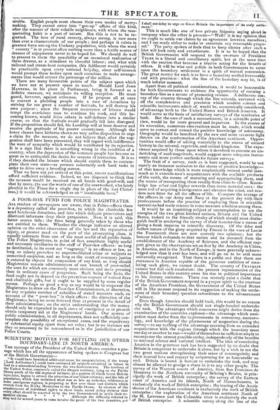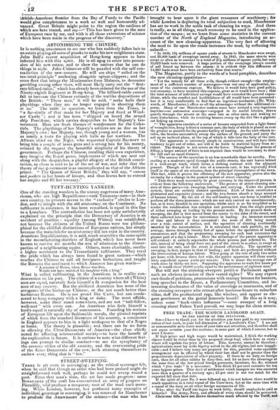SCIENTIFIC MOTIVES FOR SETTLING OUR OTHER BOUNDARY-LINE IN NORTH AMERICA.
Tuts message of the President of the United States contains a pas- sage which has all the appearance of being spoken to Congress but at the British Government- " It would have furnished additional cause for congratulation, if the treaty [Lord Ashburton's] could have embraced all subjects calculated in future to lead to a misunderstanding between the two Governments. The territory of the United States, commonly called the Oregon territory, lying on the Pacific Ocean north of the 42d degree of latitude, to a portion of which Great Britain lays claim, begins to attract the attention of our fellow-citizens; and the tide of population, which has reclaimed what was so late an unbroken wilderness in more contiguous regions, is preparing to flow over those vast districts which stretch from the Rocky Mountains to the Pacific Ocean. In advance of the acquirements of individual rights to these lands, sound policy dictates that every effort should be resorted to by the two Governments to settle their re-
spective claims. * • • • Although the difficulty referred to may not for several years to come involve the peace of the two countries, yet
Isbell not delay to urge on Great Britain the ins of its early settle-
ment."
This is much like one of two private litigants sayinic aloud is company when the other is present—" Well ! it is my opinion that we ought to settle our claims by an agreement between ourselves; and I am ready either to make or entertain any reasonable propo- sal." The party spoken at feels that to keep silence after such a hint will look surly and extortionate. It is to be hoped that the British Government will respond to the overture of President TYLER in a liberal and conciliatory spirit, but at the same time with the caution that beseems a trustee acting for the benefit of others. It will be wise and politic in both Governments to enter upon the boundary settlement in a spirit of mutual concession. The great matter for each is to have a boundary settled irrevocably and with precision : what the line of the boundary may be, is of much inferior moment.
Apart from all political considerations, it would be honourable for both Governments to embrace the opportunity of running a boundary-line as a means of promoting science. A deliberate stras vey of the country through which the line extends, executed with all the completeness and precision which modern science and scientific instruments instruments admit of, would be, economically considered, of advantage both to the United States and British America. It would serve as the basis of satisfactory surveys of the territories of both. But the uses of such a measurement, in a scientific point of view, would be far more general and important. In the course of its execution, numerous observations must be made, which would serve to correct and extend the positive knowledge of astronomy. Geography would be benefited by the new and more accurate light thrown on the conformation of the American continent. Oppor- tunities would offer of adding materially to the stores of natural history in the mineral, vegetable, and animal kingdoms. The expe- rience acquired by those upon whom it devolved to execute an un- dertaking of such magnitude, would suggest more adequate instru- ments and more perfect methods for future surveys.
The fruit of a survey, such as is here suggested, would be not merely an immense accession to the stores of positive knowledge— of that knowledge which is more emphatically termed useful inas- much as it extends men's acquaintance with the available products of the earth, the means of maturing and appropriating them, and the means of transporting them readily from clime to clime. Know- ledge has other and higher rewards than these material ones : the mere toil of acquiring itinvigorates and elevates the iniud, and ren- ders men fitter for all the offices of life. Compare the average of the officers in our Army and Navy at the present day with their predecessors before the practice of employing them in scientific operations had made science in some measure a fashion among them.
It would be an inspiriting subject of contemplation to see the energies of the two great kindred nations, Britain and the United States, tasked to the friendly rivalry of which should most distin- guish itself in rendering the survey of their frontier-line a means of giving a fresh impetus to scientific discovery. Of the false and hollow nature of the glory acquired by France in the wars of Lours the Fourteenth there are now scarcely two opinions; • but the honour which redounds to that nation and its monarch from the establishment of the Academy of Sciences, and the efficient sup- port given to the observations set on foot by the Academy in China, in America, and in the North of Europe, is more generally acknow- ledged now than it ever has been, and will go on to be still more universally recognized. That there is a public and that there are statesmen in America capable of the generous ambition of emu- lating such glory, we cannot doubt. The country of FRANKLIN cannot but feel such emulation : the present representative of the United States in this country owes his rise in political importance to his literary eminence. There can scarcely exist a doubt that if the British Government respond in a proper spirit to the overture of the American President, the Government of the United States will in like manner respond to its suggestion of making the settle- ment of their boundary question subordinate to the advancement of science.
Even though America should hold back, this would be no reason why the British Government should not single-handed undertake the task. The advantages which commerce might derive from the examination of the countries explored—the advantage which navi- gation must derive from the improvements in astronomy, meteoro- logy, and knowledge of' the phenomena of magnetism during the survey—to say nothing of the advantage accruing from an extended acquaintance with the regions through which the boundary must one day or another be run—would of themselves be sufficient amply to recompense the utmost possible outlay, independently of the benefits to national science and national intellect. The idea of associating America in the generous task has been suggested by no doubt that Britain is competent to undertake it alone, but by a wish to see the two great nations strengthening their sense of consanguinity and their mutual love and respect by cooperating for so honourable an end. Britain is bound In honour to undertake the task, and may almost be allowed to grudge a share in it to any other people. The survey of the Western coasts of America, from San Francisco de Monterey to the Northern extremity of Behring's Straits, is prin- cipally the work of British enterprise ; the survey of the Eastern coast of America and its islands, North of Massachussets, is exclusively the work of British enterprise ; the tracing of the Arctic shores of the American continent is exclusively the work of British enterprise ; the exploration of the American continent North of the St. Lawrence and the Columbia river is exclusively the work of British enterprise. A scientific survey along the line of the '3ritish-American frontier from the Bay of Fundy to the Pacific would give completeness to a work so well and honourably ad- vanced. Great Britain might point to the region the outlines of which are here traced, and say—" This has been given to the men of European race by me, and with it all those extensions of science which have been made in the progress of the discovery."































 Previous page
Previous page